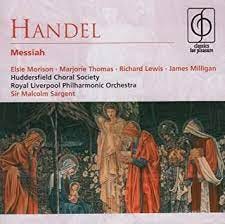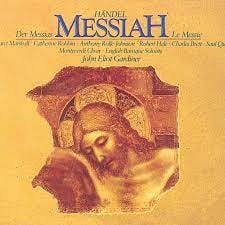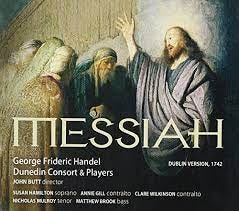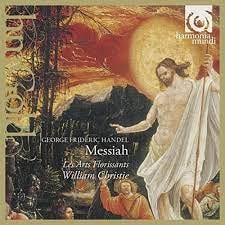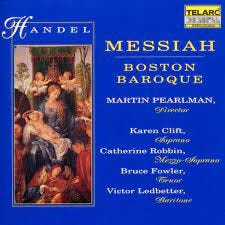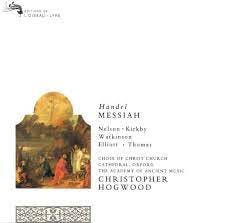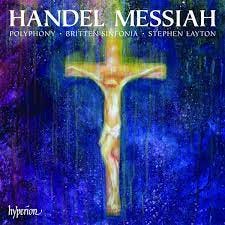Handel's Messiah: The top 10 recordings
Happy New Year! Welcome to a special edition of the 50 greatest classical recordings of all time. Why is it a special edition? Well, after Tchaikovsky’s The Nutcracker, the other perennial Holiday favorite that is familiar to many is Handel’s Messiah. But the reason this is a special edition is that none of the currently available commercial recordings of Handel’s Messiah rise to the top 50 recordings of all time. To be clear, this doesn’t mean there aren’t many very good recordings of the work, but none of them have acquired legendary status in my opinion.
No doubt many will have their favorite recordings, and some versions are quite distinguished and memorable. But the lack of Messiah among the top 50 is likely due to the Messiah being a particularly difficult work to pull off successfully due to its length, the size of the orchestral and choral forces needed, the many different versions of the score, and the challenges that the soloists face. There are some fiendishly difficult parts for the soloists, and if they are not done well, the result can be comic at best and painful at worst.
So what are we left to do since Handel’s Messiah is such a popular and enduring work? Rather than choose just one recording that stands above the others, I thought it would make sense to list the top 10 recordings of Handel’s Messiah, so you may sample them to make your own decision. The 10 best Messiahs are a combination of old favorites along with some newer versions, and also run the gamut in terms of performance style and vision. Some are more fleet using historically informed performance manners that have become more common in recent years. Others are more traditional and somewhat slower, and represent perhaps a more sentimental or even romantic approach to the work. There is not a right or a wrong interpretation, but listeners may have certain preferences.
But first, a little background on The Messiah. In 1741, William Cavendish, the Duke of Devonshire and Lord Lieutenant of Ireland, invited Handel to Dublin to participate in a season or oratorio concerts to benefit local charities. By this time Handel was living permanently in England (Handel was German by birth, but became a naturalized British subject in 1727), and readily accepted the invitation. He set to work on a new oratorio and composed The Messiah in only 24 days, remarkable especially considering the length of the piece. However, composing quickly was not unusual for Handel.
Charles Jennens, who had supplied texts for many of Handel’s oratorios, sent him a new word- book in 1741. The text was a collection of scripture passages from both the Old and New Testaments covering prophecies and birth of Christ, his death and resurrection, and the redemption and response of the believer. Handel set the text to music, and the resulting work has inspired audiences ever since.
There was such great anticipation for Handel’s work in Dublin that an announcement in the Dublin Journal requested that ladies, “would be pleased to come without hoops in their skirts…making room for more company.” The piece was premiered on April 13, 1742 at the Music Hall in Dublin with Handel conducting. It was received warmly, the Journal reporting that “The Sublime, the Grand, and the Tender, adapted to the most elevated, majestic and moving Words, conspired to transport and charm the ravished Heart and Ear.” It was given for the first time in London a year later at Covent Garden, though critics decried that it was not in fact a “sacred” work because it was not in any way a didactic or liturgical work. Jennens himself called it “a fine entertainment” and saw that it was fitting it be performed not in a church, but in a concert hall. Nevertheless, the sincerity of Handel’s religious feelings are not in question. Soon after finishing writing the famed “Hallelujah” chorus, he allegedly said with tears streaming down his face, “I did think I did see all Heaven before me and the great God himself.”
Handel, in his own performing arrangements of Messiah, made many changes to the orchestration and vocal parts to suit the different groups and soloists performing it. This was not unusual, and so today what we experience in performance or on recordings is really an amalgamation of different versions chosen by individual conductors or music directors. It is well nigh impossible to recreate what may have been an exact performance as Handel would have heard in his day. That is why, if you listen to some or all of the 10 recordings listed here, you will notice some variations from one to another.
Finally, there is the question whether to stand or not to stand for the Hallelujah chorus? The legend goes that at one of the first performances in London in 1743, King George II was so moved by the “Hallelujah” chorus that he rose to his feet. In deference to the King, the crowd thus was obliged to follow suit and so stood as well and remained standing through the end of the chorus. The tradition took hold, and has survived for centuries now, and today in concert you will still find audiences rising for the chorus. As with many traditions, the truth of the story is not so clear. There is little evidence that anything of the sort happened in 1743, and the first documented mention of the tradition came in 1780, many years later. In first-hand accounts of performances from Handel’s lifetime, there is no mention of the practice. Some latter-day conductors have even argued against it, citing it as a distraction. Nowadays, audience members are left to decide for themselves (during my own most recent attendance of The Messiah in 2015 with the Handel + Haydn Society at Boston’s Symphony Hall, the audience did indeed stand for the chorus).
Now on to the recordings of The Messiah that are most compelling. I have divided the 10 recordings into two categories: those that use modern instruments and modern playing practices, and those that use authentic historical instruments and historically informed playing practices. Some of what you may hear with the historically informed practices include less vibrato from the strings and singers, and at times a quicker pace. Once again, the order listed is not intended as a ranking.
Modern instruments and modern practices
1. Chicago Symphony Orchestra and Chorus / Sir Georg Solti
Recorded in 1984, almost at the beginning of the digital music era, the first Handel Messiah in the top 10 is a widely acclaimed version by the Chicago Symphony Orchestra led by its longtime music director Sir Georg Solti. If not for one significant flaw, this recording would be among my top 50 classical recordings of all time. It has many things going for it: excellent sound, very good soloists, a powerful chorus and orchestra, and simply the best “Hallelujah” chorus ever recorded in my opinion. In fact, the choral work throughout is outstandingly clear and inspiring. While modern instruments are used, Solti still maintains a good flow throughout without bombast or heaviness.
The soloists, with one exception, are outstanding. There are two singers from New Zealand, the tenor Keith Lewis and legendary soprano Kiri Te Kanawa. Lewis is one of my favorite Messiah tenors on record, with a lovely tone and style in “Comfort ye” and “Ev’ry Valley”. He adds some ornamentation, but does so tastefully. He never sounds forced, and I always return to his singing here because I find it to be the ideal. Te Kanawa is also ravishing in her arias, particularly in “I know that my redeemer liveth” in part three. Gwynne Howell is a strong bass voice, and sings admirably in his big arias such as “The Trumpet Shall Sound” and “Why do the nations so furiously rage?”. The one mistaken bit of casting is the Norwegian alto Anne Gjevang. While supposedly an accomplished opera singer, for me her singing is difficult to deal with on this recording and sounds completely out of place for an oratorio. Her tone is too matronly and fruity in my opinion. It is unfortunate because otherwise this recording would be the hands down winner. Even with this flaw, the recording deserves to be among the top versions available.
2. London Symphony Orchestra and Chorus / Sir Colin Davis
When this recording was made in 1966, it was somewhat pioneering in the sense that it used the full score without any cuts. You will notice some movements are slower than more recent recordings, but there is no lack of tension or dramatic intensity. Orchestra and chorus are well recorded, even though the recording certainly shows its age with some background hiss and some slight distortion. All four soloists were at the peak of their career on this recording, and all of them deliver good performances. My only quibble is that all of them sound more “operatic” than is typical, and in particular alto Helen Watts sounds like she is more suited to the opera stage. But the orchestra and chorus are clearly very engaged, and play their hearts out for Colin Davis. He uses a score that calls for some ornamentation added to the tail end of some string phrases, but it seems to fit. This is a performance in the grand manner, in places almost romantic sounding, but I also find these qualities endearing. Sir Colin Davis recorded Messiah again with the London Symphony Orchestra and Chorus in 2006 for the LSO Live label, but it this earlier recording that is the better of the two. He recorded it also with the Bavarian Radio Symphony Orchestra in 1985, a version that is generally best avoided.
3. Royal Liverpool Philharmonic Orchestra / Sir Malcolm Sargent
And now for something completely different…this Messiah was recorded in 1959, and as a result the sound is somewhat compromised. Sir Malcolm Sargent clearly loved Handel’s Messiah, also recording it other times. But this version from Liverpool is the preferred choice for its heartfelt devotion and lyricism. Two examples are the opening “Comfort ye…Ev’ry Valley” sung by tenor Richard Lewis and later “He was despised” sung by Marjorie Thomas. There is some truly beautiful singing here. Sargent’s obvious sensitivity to the text and the way the orchestra, chorus and soloists put meaning into the performance makes this very special. Of course, Sargent takes liberties with the score, in places slowing down where there is no indication to do so, and putting a more “romantic” touch in his interpretation. While some may say it is not very “authentic”, it does result in a very moving performance that is something to treasure. The choral pieces sound a bit congested at times, no doubt due some extent to the age of the recording. Bass James Milligan’s voice is something to hear too, especially in “The Trumpet Shall Sound”. Soprano Elsie Morison is moving too in “I know that my redeemer liveth”. Even given that the choruses are among the slowest you will ever hear, they convey warmth and beauty.
Historically Informed Recordings with Period Instruments
4. English Baroque Soloists and Monteverdi Choir / John Eliot Gardiner
There are literally dozens of choices of Messiah recordings among period instrument groups. But this one by the English Baroque Soloists and Monteverdi Choir conducted by John Eliot Gardiner for me remains the best of the lot and narrowly misses being in my overall top 50 classical recordings of all time. I remember distinctly when this recording was released in 1983 it was enthusiastically received. The choir is absolutely pristine technically and musically, and execution is superb. There is a lot of refinement in the performance, and the recorded sound is delightfully transparent so you can hear a lot of detail. Overall this is not a “knock your socks off” kind of performance with a big sound. Rather it is Gardiner’s fairly scrupulous approach to the score and text while maintaining a more sacred atmosphere. In fact, you may find yourself wanting a bit more grandeur in certain spots. But nonetheless this is a first-rate recording with many insights and much to enjoy. At the time it was released, the tempos were faster than were generally heard, although today they certainly are more middle of the road. Outstanding among the soloists is Anthony Rolfe Johnson, who brings an almost effortless tone with a great deal of shading and meaning. I like that he doesn’t push too hard, it sounds very natural. He is a tremendously gifted artist. The soprano Margaret Marshall also is caught very well, and even though she uses some vibrato in her voice, it does not get in the way. The alto Catherine Robbin, while not particularly revelatory, is consistent in tone and articulation. Charles Brett, at the time one of the leading countertenors around, is particularly beautiful in tone especially in “But who may abide”, a fiendishly difficult piece. Gardiner aptly chooses to use a boy treble voice for the recitatives preceding “Glory to God”, which I enjoy. Robert Hall, the bass soloist, is dependable, if not exciting. In summary, an excellent Messiah choice.
5. Dunedin Consort & Players / John Butt
The Dunedin Consort & Players led by John Butt present the “Dublin” version of Handel’s Messiah. You may notice a few unique features here and there, but by and large this is pretty much the Messiah we are familiar with by now. “But who may abide” being sung by the baritone/bass was certainly different, but not necessarily an improvement. The entire set has a more “rustic” feeling to me, but this is not a drawback in the least. In fact, it may bring greater focus and detail. While the choir may lack the refinement of Gardiner’s group (see above), they are nonetheless very memorable and clear. The tenor Nicholas Mulroy sounds a bit forced to me in spots, and although relatively pleasant his singing in the opening arias is not among my favorites. Bass Matthew Brook is very impressive, and for me is one of the finest bass performers on disc. I also love the voice of soprano Susan Hamilton, she brings an almost childlike or angelic quality to her singing which is light and expressive. Contralto Annie Gill is really lovely too on “O Thou that tellest”. The chorus is sprightly and quick in “For Unto Us a Child is Born” and I very much enjoy how the strings use staccato notes or more legato notes as necessary to match the vocal line. There are vocal embellishments throughout, but they are thoughtful and well done. Occasionally I would like more power from the chorus, but that is a small matter. Highly enjoyable.
6. Les Arts Florissants / William Christie
Another period instrument Messiah was recorded in 1993 by the excellent French band and choir Les Arts Florissants led by its longtime director William Christie. It has the advantage of clean and clear sound capturing very well the beautiful choral singing. The diction from the mostly French speaking choir is impeccable. A young Mark Padmore at tenor is real advantage, strong yet sensitive in his style. Countertenor Andreas Scholl is outstanding, and his performance of “But who may abide…” is among the finest. The sopranos are both exceedingly fine, particularly Barbara Schlick. While she does use some embellishments in her numbers, she is confident and tasteful. Bass Nathan Berg is memorable as well with a firm tone that is full of character and brings out the meaning of the text. Orchestra execution is light and yet still weighty enough when needed. The choral pieces are clear, incisive, and thrilling. There really is not a weak link in this recording, and it should bring you a of enjoyment.
7. Boston Baroque / Martin Pearlman
Pearlman’s Messiah from 1992 is also one of the best versions available. You will also find it to be one of the swiftest versions, even for period instrument recordings. The quartet of soloists is very good, though not the best on record. Special mention should be made of the outstanding soprano Karen Clift, her bright and clear voice bringing true joy to “I know that my Redeemer liveth”. Tenor Bruce Fowler is good as well, though not my favorite by a long distance. Victor Ledbetter on baritone is memorable, though his voice will not raise the dead like some others. Catherine Robbin, the mezzo-soprano, is a notch more characterful than in the Gardiner version. The Boston Baroque choir also deserves accolades, they are brilliant in their big numbers such as “For unto us a child is born”, “Glory to God”, “Hallelujah”, and and often the case with historically informed performances, but I don’t find it lacking in warmth or strength. If I may admit I find some of the tempos a bit too fast for my taste, and occasionally I would have appreciated some more variance in the approach from Pearlman. There is no doubt this is a wonderful Messiah, but there is a tendency for the movements to sound quite the same upon repeated listening. But this is a small matter in a truly enjoyable recording.
8. Academy of Ancient Music / Christ Church Choir, Oxford / Christopher Hogwood
Recorded in 1980 at St. Jude-on-the-Hill in London, this version from the Academy of Ancient Music and the Choir of Christ Church Cathedral, Oxford conducted by period instrument pioneer Christopher Hogwood is certainly one of the finest recordings of Messiah, and may very well be the most “authentic” (although again that is difficult to say because Handel changed it so many times). Hogwood was scrupulous in his research before this recording was made, and you will hear some unique touches. The use of boy sopranos is the biggest difference you will notice from the other versions listed here, and this would have most likely been the practice used by Handel himself. While I like the idea of the boy voices, I find myself missing female voices in those parts of the score. The orchestral forces here are also scaled down quite a bit, and in places you will notice the strings and woodwinds sound a bit thin. The choir from Christ Church Cathedral sings movingly and lend a sacred tone to the affair. The recorded sound is good, though perhaps lacking the last ounce of clarity and not quite as detailed as many of the other recordings on this list. The soloists are a mixed bag. The two sopranos, Emma Kirkby and Judith Nelson, are nothing short of amazing in my opinion and their contributions alone put this version in the top 10. Both sing with a period sensibility, adding light touches and some embellishments, but always at the service of the music and text. They both bring effortless sounding, angelic tones to their arias. Tenor Paul Elliott brings a plaintive style with very little vibrato to his parts, which also matches the styles of Kirkby and Nelson. I am not particularly fond of the other singers, contralto Carolyn Watkinson and bass David Thomas. They are fine, but not as distinguished as the other soloists. But if you enjoy Messiah, you really should hear this recording.
9. Collegium Musicum 90 / Richard Hickox
I am very fond of this recording by Collegium Musicum 90 conducted by the late Richard Hickox. It was made in the Church of St. Jude in London in 1991. It is yet another period instrument performance, but for me it is one of the most underrated recordings and I don’t understand why it is not more acclaimed. The sound is exemplary. The orchestra, choir, and soloists are all very good. Tempos are fairly middle of the road, although some of the choral pieces move along at a pretty good clip. The recording is notable for having the young bass Bryn Terfel giving a tremendous performance, this was before Terfel became an international opera and recording star. But it is easy to hear how captivating his voice could be, especially in “Why do the nations so furiously rage” and “The trumpet shall sound”. I also enjoy the use of a countertenor, especially in “But who may abide” and Christopher Robson performs beautifully. I also am fond of tenor Philip Langridge’s performance here, he sounds just right in my opinion. He doesn’t try to do too much embellishment, but maintains a full and musical tone. I am not enamored with the voice of mezzo-soprano Della Jones, but soprano Joan Rodgers has a beautiful sound to her voice. The big choral numbers are well sung and sprightly. A very solid choice for Messiah.
10. Britten Sinfonia / Polyphony / Stephen Layton
Last, but certainly not least, in our top 10 Messiah recordings is one of my favorites. The Britten Sinfonia, an independent chamber orchestra from the UK, and the choral group Polyphony are led by Stephen Layton in one of the most beautiful performances that I have loved since the first time I heard it several years ago. The recording boasts outstanding soloists as well with soprano Julia Doyle, countertenor Iestyn Davies, tenor Allan Clayton, and bass Andrew Foster-Williams. The Britten Sinfonia use modern instruments but with a historically informed performance style, meaning you get very little vibrato but still have a bit more sheen on the sound. The tempos are quick, but well-judged, and the solemnity of the theme is respected. The recording was made at St. John’s Church, Smith Square, London just before Christmas in 2008. Although the orchestral and choral forces are not large, there is a full and satisfying sound. Julia Doyle has a breathtakingly beautiful voice, tenor Allan Clayton is direct and effective without being too showy, and bass Andrew Foster-Williams is excellent in his numbers. Countertenor Iestyn Davies deserves special mention, because for me he is the star of this performance. 29 years of age at the time of this recording, he sings with purity, beauty, and thoughtfulness. His tone is commanding yet gentle. Taking on the alto and/or contralto parts, for me Davies is simply unsurpassed in both his interpretation and his tone. It is ideal for Messiah. The major choral numbers are thrillingly done, and at the end everything just feels right. A tremendous accomplishment.
Which brings us to the end of our survey of the top 10 recordings of Handel’s Messiah. As much I adore it, having now listened to all of the above recordings completely, I am now ready to put it aside until the Holidays roll around again.
I must apologize for the delay in publishing this entry, it took me much longer than anticipated. But I truly hope you will find the above reviews helpful, and find at least one recording of Messiah that you enjoy listening to again and again.
Best wishes to everyone for a great 2022!
______________________________________
Golding, Robin (1966). Handel’s “Messiah” – A Sacred Oratotio? Philips Silver Line Classics liner notes. Pp. 6-10.
Neff, Teresa M. (2015). Messiah: A Boston Tradition. Handel & Haydn Society Program Notes, 2015-2016 Season. Pp. 21-25.


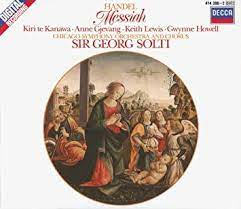
![makdelart - classique: Handel - Messiah (Colin Davis, 1966) [2CD] makdelart - classique: Handel - Messiah (Colin Davis, 1966) [2CD]](https://substackcdn.com/image/fetch/$s_!tFJj!,w_1456,c_limit,f_auto,q_auto:good,fl_progressive:steep/https%3A%2F%2Fbucketeer-e05bbc84-baa3-437e-9518-adb32be77984.s3.amazonaws.com%2Fpublic%2Fimages%2F6f9fc343-7e87-4271-afaf-058fed7606a3_242x208.jpeg)
